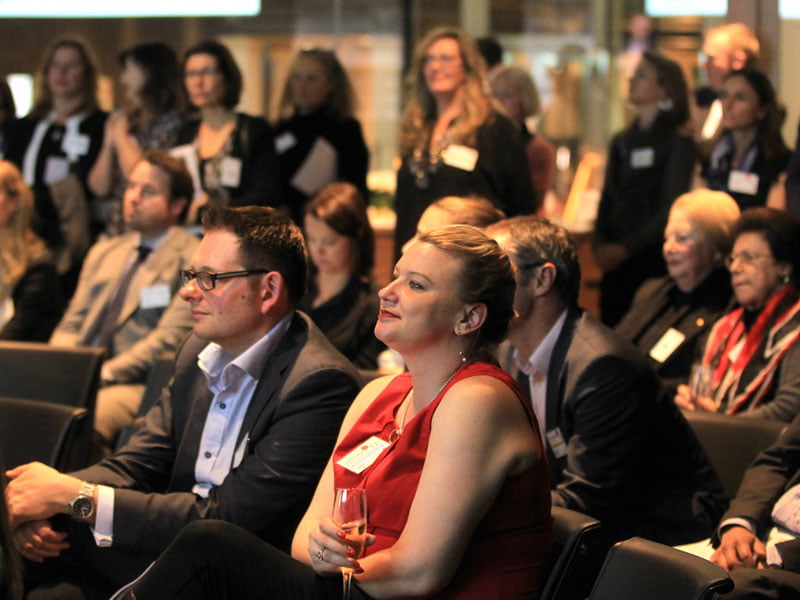Just 3 per cent of venture backed companies are backed by women; Heads Over Heels wants that to change.
The organisation was established in Australia five years ago with the intent of helping forge the networks that women entrepreneurs need to scale their businesses.
Speaking at the most recent Portfolio Event which showcased female-led enterprises, Gazaleh Lyari, chairman of Heads Over Heels, and a member of the investment team at CHAMP Ventures, said that there was only a small number of women leading businesses that have scaled successfully.

“Women lack the networks that predict success…Men have powerful sponsors that fight on their behalf,” she said.
Heads Over Heels attempts to address that situation by deliberately forging networks to support women business leaders.
At a Portfolio Event three female chief executive officers, selected by Heads Over Heels for having a business with scale potential, have the opportunity to pitch their business and growth plans to a handpicked audience of business people and investors.
They conclude with their “asks” which might include the need for introductions to potential clients, investors, publicity, mentors, partners and the like.
After the pitches, individual CEOs move into “huddles” with a third of the audience who then volunteer to leverage their existing networks to make the necessary introductions and deliver the “asks”, before repeating the process with the other two CEOs at the event.
According to Lyari at the preceding event the presenters drummed up around $300,000 worth of additional revenues from introductions arising out of the huddles. Since the group was set up in 2010 30 women CEOs have pitched at the event, with an estimated 1,700 introductions arising as a result.
Having more visible examples of women leading and scaling businesses is important according to Narelle Hooper, co-author with Rodin Genoff, of recently published book New Women, New Men, New Economy.
Hooper laments the narrow selection of largely male voices which are dominating the innovation and disruption debate, leaving a vacuum where there ought to be “visible role models which are vital for generations coming through.”
She said that Australian organisations need more diversity in terms of their innovation, to ensure that there is a range of different perspectives considered from the outset.
“Otherwise we’re not going to be asking the right questions and solving the right problems with products and services that humans actually want to use.
“Likewise the notion that disruption and startups are about beer and pizza hack days. That tends to only work for a narrow group – young, mostly male – when we’re now seeing startups and disruption from baby boomers too.
“The popular image of the frat house startups simply replicates a culture of underlying sexism that has endured during the past couple of decades in tech. Why would you want to even be there?”
The women CEOs presenting at the Heads Over Heels events instead are establishing businesses on their own terms.
At the October event three CEOs pitched their companies and asks; Liz Kaelin CEO and Co-founder of YouChews – which is aiming to disrupt the casual office catering market through a platform that allows companies to buy food from local restaurants, caterers or food trucks; Susan Cates, co-CEO and co-founder of fashion accessories business Urban Originals; and Tessa Court, CEO and founder of IntelligenceBank – a Software as a Service business that provides a platform for managing information – with applications ranging from a board paper management portal to enterprise knowledge management.
Court said that IntelligenceBank has already been deployed at Jetstar, NAB, the Department of Premier and Cabinet and now has 200 plus customers in 55 countries.
Launched in 2009 and profitable after three years, the company has recently opened offices in the US – but by the end of next year will be looking for a funding round of $5-$10 million that will allow it to continue to scale.
Court said that while she has not personally experienced any bias against women entrepreneurs she acknowledged the statistics regarding the relatively low percentage of women CEOs in scaled businesses.
She did question whether part of the issue was the sorts of businesses that women might found – “cupcake or mumpreneur” operations – that did not lend themselves to scale.
“I don’t think that VCs are biased against women – but they might not “get” a business that’s aimed at women,” she said.
While Court has not experienced discrimination, she has benefitted from Springboard’s personal and professional development aimed at women business leaders, and now the Heads Over Heels initiative.
“I will always take advantage of any business networking opportunity.”
Do you know more? Contact James Riley via Email.

